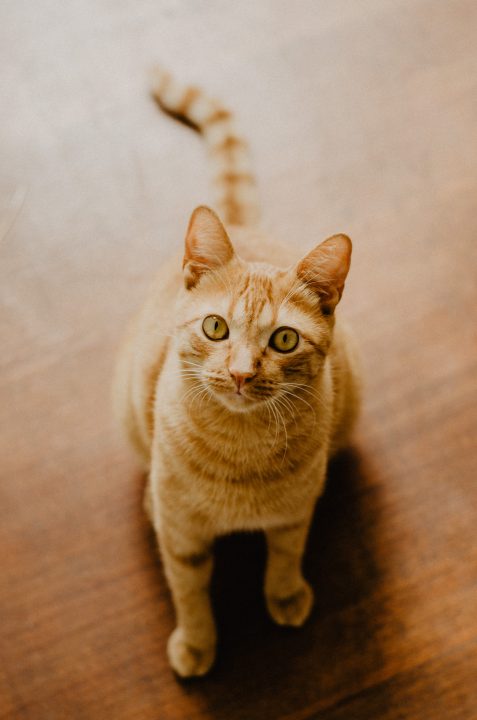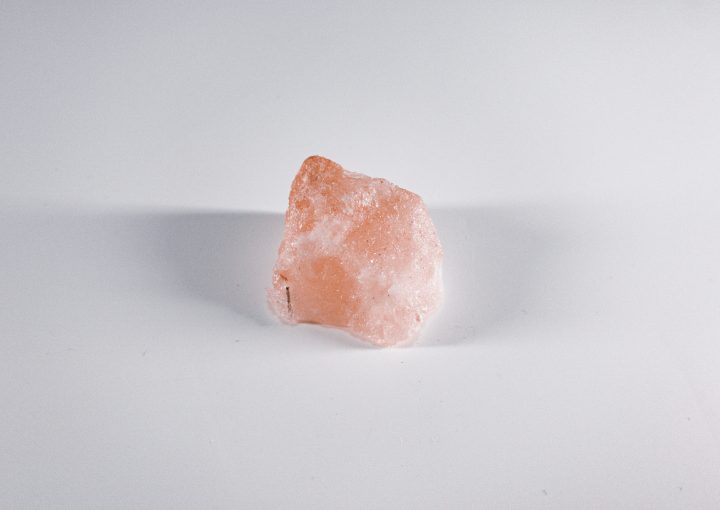Wer liebt nicht eine salzige Brezel oder ein paar Peperoni? Während Ihr katzenartiger Freund vielleicht miaut und an Ihren Beinen scharrt, um eine Chance zu haben, solche Leckereien zu probieren, können Sie nicht umhin, sich zu fragen, ob Katzen Salz mögen? Da Salz einer der drei Geschmacksrichtungen ist, die Katzenzungen wahrnehmen, lieben sie salzige Dinge. Das führt jedoch zur nächsten Frage: Ist Salz gesund für Katzen?
Dies ist ein wichtiges Thema für Katzenbesitzer, also lasst uns keine weitere Sekunde verschwenden!

Inhaltsverzeichnis
- Mögen Katzen Salz?
- Können Katzen Salz haben?
- Wie viel Salz ist sicher für Katzen?
- Was ist Natriummangel bei Katzen?
- Macht Salz Katzen krank?
- Halten Sie Ihre Pfoten von der Salzlampe fern
- Häufig gestellte Fragen
Mögen Katzen Salz?
Ja, Katzen mögen Salz. Oder vielleicht ist es besser zu sagen, dass sie Salz lieben. In jedem Fall ist alles Salzige ein verlockender Leckerbissen für Katzen, und sie werden alles Salzige appetitlich finden (sogar Nonfood-Artikel). Das ist einer der Gründe, warum Katzen gerne an deinen Tränen oder deinem Schweiß lecken.
Können Katzen Salz haben?
Ja, Katzen dürfen Salz haben. Tatsächlich brauchen sie Salz, um zu überleben. Wie die meisten empfindungsfähigen Lebewesen wird Salz für Prozesse des Nervensystems und die Bewegung von Nährstoffen benötigt. Salz hilft auch, Signale durch den Körper zu leiten, wenn eine Katze das Katzenklo benutzen muss. Ohne Salz würde der Körper einer Katze abschalten und nicht mehr richtig funktionieren.
Sehen Sie sich dieses Lehrvideo an, ob Katzen Salz haben sollten:
Wie viel Salz ist sicher für Katzen?
Schauen Sie sich Katzenfutter an – nass oder trocken, es spielt keine Rolle. Sie werden feststellen, dass Katzenfutter viel mehr Natrium enthält, als Sie wahrscheinlich dachten. Aber wie viel Salz brauchen Katzen wirklich? Um 21-40 mg Salz pro Tag.
Das ist es.
Für Menschen klingt das nicht nach viel. Für Katzen ist es ausreichend. Denken Sie jetzt daran, dass einige größere Katzen etwas mehr Salz verbrauchen können.
Sie müssen jedoch darauf achten, wie viel von dem salzigen Zeug Ihre Katze frisst. Salz ist in Nass- und Trockenfutter sowie Leckereien enthalten. Wenn Sie bemerken, dass sich der Urin Ihrer Katze verändert hat oder dass sie Anzeichen von Harn- oder Nierenproblemen zeigt, beginnen Sie damit, einige Salzquellen aus ihrer Ernährung zu entfernen.
Was ist Natriummangel bei Katzen?
Es gibt ein empfindliches Gleichgewicht zwischen zu wenig und zu viel Salz für Katzen. Viele Katzen brauchen etwas Salz in ihrer Ernährung, sonst könnten sie darunter leiden Natriummangel. Dies bedeutet, dass Ihre Katze nicht genug Salz in ihrem Blutkreislauf hat, um richtig zu funktionieren. Da Natrium für alle Lebewesen essentiell ist, müssen Sie Ihrer Katze zusätzliches Salz geben, um den Mangel zu beheben.
Natriummangel kann zu neurologischen Komplikationen führen. Wenn Sie bemerken, dass sich Ihre Katze seltsam verhält, bringen Sie sie bitte zum Tierarzt.
Darüber hinaus kann ein Natriummangel durch andere medizinische Probleme wie Nierenversagen, Hypothyreose, kongestive Herzinsuffizienz, nephrotisches Syndrom und mehr verursacht werden. Auch hier ist die tierärztliche Versorgung der einzige Weg, um sicher zu sein, was passiert.
Macht Salz Katzen krank?
Nein, Salz macht Katzen in angemessener Menge nicht krank. Wenn Ihr Katzengefährte es schafft, mehr als 42 mg Salz pro Tag zu sich zu nehmen, könnte er krank werden. Große Salzdosen können geradezu schädlich sein.
Wenn eine Katze zu viel Salz hat, kann sie eine Salzvergiftung entwickeln. Zu den Symptomen einer Salzvergiftung gehören:
- Durchfall
- Lethargie
- Erbrechen
- Appetitlosigkeit
- Austrocknung
- Verlust von Koordination und Gleichgewicht
- Anfälle
- Aggression
- Fieber
Jedes Mal, wenn Sie diese Symptome sehen, warten Sie nicht. Bringen Sie Ihre Katze sofort zum Tierarzt, da eine Salzvergiftung unbehandelt tödlich sein kann.
Außerdem sollten Sie bestimmte Arten von Salzen von Ihrer Katze fernhalten. Steinsalz, Salzwasser (Meerwasser), Himalaya-Salzlampen und Speisesalz können alle unglaublich gefährlich sein.
Ein Fall von Salzvergiftung
Mögen Katzen Salz? Teilweise zu viel. Nehmen Sie zum Beispiel die Neuseeländische Katze namens Ruby der ein bisschen zu viel Zen um die Salzlampe hatte. Rubys Besitzerin Maddie Smith hatte eine Himalaya-Salzlampe mit nach Hause gebracht. Sie wusste nicht, dass Ruby daran geleckt hatte, bis die Katze sich sehr seltsam verhielt – sie ging mit gesenktem Kopf.
Erschrocken über die Veränderung ihres vierbeinigen Begleiters, fegte Maddie Ruby hoch und brachte sie zu einem Notfall-Tierarzt. Beim Tierarzt erfuhr Maddie, dass ihre Katze giftige Natriumwerte im Blut hatte. Dies wiederum ließ Rubys Gehirn anschwellen, was sich in einem schwankenden Gehen und einem hängenden Kopf manifestierte.
Maddie hat es herausgefunden – dass Ruby an die Salzlampe gelangt war. Es war die einzige Änderung, die sie vorgenommen hatte. Wenn Sie also vorhaben, sich eine Salzlampe zuzulegen, stellen Sie sicher, dass Ihre Katzen weit davon entfernt sind.
Wie behandelt man eine Salzvergiftung bei Katzen?
Unfälle passieren. Vielleicht hat Tiger zufällig den Salzstreuer von der Arbeitsplatte gestoßen und angefangen, am verschütteten Salz auf dem Boden zu lecken. Vielleicht hat Ihre Katze angefangen, Wasser aus dem Aquarium zu trinken (ebenfalls ein No-Go). Wenn Sie vermuten, dass Ihre Katze eine Überdosis Salz hat, beobachten Sie sie auf Symptome. Wenn Sie auch nur die geringste Veränderung bemerken, rufen Sie den Tierarzt an und teilen Sie ihm mit, was passiert ist. Du solltest gleich einsteigen.
Der Tierarzt kann intravenöse Flüssigkeiten verabreichen, um das Natrium aus dem Körper Ihrer Katze zu spülen. Diese Methode ist sehr effektiv, um den Natriumspiegel Ihrer Katze zu normalisieren. Es werden auch Tests durchgeführt, um zu sehen, wie es den Organen Ihrer Katze geht und ob ihre Gehirnaktivität normal ist.
Danach braucht Ihre Katze etwas Flüssigkeit und viel Ruhe.
Wenn eine Salzvergiftung früh erkannt wird, ist sie leicht zu behandeln; Die Prognose ist auch gut. Es ist jedoch, wenn Sie warten, dass dauerhafte Hirnschäden auftreten können. Halten Sie also Ihre Augen offen zu Ihrer neugierigen Katze, wenn sie in der Nähe von Salz ist.

Halten Sie Ihre Pfoten von der Salzlampe fern
Mögen Katzen Salz? Das tun sie auf jeden Fall! Katzen lecken an Salzlampen und gehen jedem salzigen Bissen nach, den sie finden können. Tatsächlich mögen Katzen Salz so sehr, dass sie einem ständigen Risiko einer Natriumvergiftung ausgesetzt sind. Behalten Sie am besten im Auge, wie viel Salz Ihre Katze zu sich nimmt, insbesondere wenn sie älter ist oder das Risiko von Harn- oder Nierenproblemen besteht. Kurz gesagt, stellen Sie sicher, dass Ihre Katze eine natriumarme Diät einhält.
Häufig gestellte Fragen
Nein, es wird Katzen nicht empfohlen, übermäßig viel Salz zu sich zu nehmen. Während kleine Mengen Salz für verschiedene Körperfunktionen, einschließlich der Aufrechterhaltung des richtigen Elektrolytgleichgewichts, unerlässlich sind, kann zu viel Salz für Katzen genauso schädlich sein wie für Menschen. Der Körper von Katzen ist für eine übermäßige Salzaufnahme nicht gut gerüstet, und ein hoher Natriumgehalt kann zu gesundheitlichen Problemen führen.
Katzen haben als reine Fleischfresser kein natürliches Verlangen nach Salz wie Menschen. Wenn Sie beobachten, dass eine Katze ein scheinbares Verlangen nach Salz hat oder ungewöhnliche Verhaltensweisen in der Nähe von Salz zeigt, könnte dies auf ein zugrunde liegendes Problem hinweisen, das Aufmerksamkeit erfordert.
Es wird im Allgemeinen nicht empfohlen, dem Wasser Ihrer Katze Salz hinzuzufügen. Katzen haben im Vergleich zu Menschen andere Ernährungs- und Ernährungsbedürfnisse und ihr Körper reagiert empfindlich auf Veränderungen im Elektrolythaushalt. Während geringe Mengen Natrium für die Körperfunktionen unerlässlich sind, kann zu viel Salz für Katzen schädlich sein.





